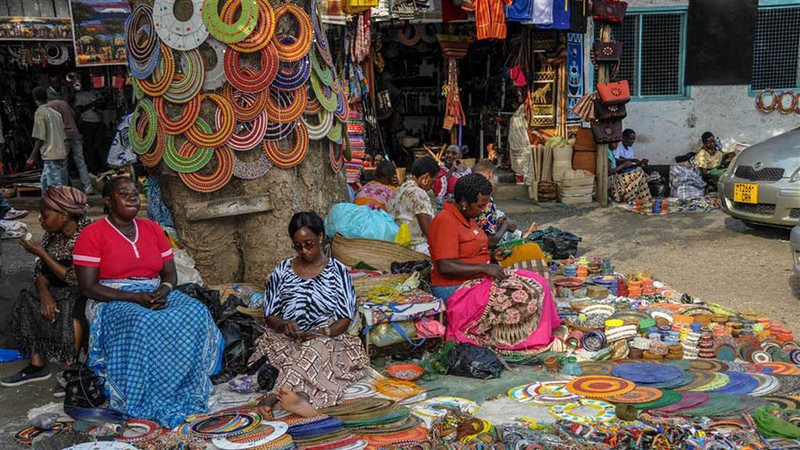
Tanzania is a country located in East Africa, sharing borders with Kenya, Uganda, Rwanda, Burundi, the Democratic Republic of the Congo, Zambia, Malawi, and Mozambique. The economy of Tanzania is composed of the agricultural, industrial, and services sectors. Tanzania is one of the largest agricultural producers in Africa. Over 80% of the active population in the country is engaged in the agricultural sector. Major crops produced include cereals such as maize, rice, and wheat, as well as dates, coffee, watermelon, potatoes, and tobacco.
Tanzania`s important industries include food processing, textiles, steel, cement, chemicals, mining, and timber. In recent years, Tanzania has made efforts to develop its industrial sector and attract foreign investments. Tanzania has significant seaports that facilitate imports and exports. Tanzania`s main export products include cashews, coffee, tea, saffron, bananas, pineapples, fish, and timber products. Additionally, Tanzania has important mining activities and possesses resources such as gold, diamonds, nickel, phosphate, zinc, and coal.
Tanzania has a large population and a strong domestic market. Moreover, the Tanzanian government has implemented programs to attract foreign investments and develop the private sector. Some of the key economic challenges in Tanzania include unemployment, poverty, income inequality, and inadequate economic and transportation infrastructure. The government is currently working on implementing programs for economic development, attracting investments, and improving social welfare.
-
 Rocu Gems Trading Ltd. 2 months ago
Rocu Gems Trading Ltd. 2 months ago Tanzania
Gemstones
Tanzania
Gemstones
The gemstones of Tanzanite, sapphires, rubies, and spinels are the top gemstones extracted from our mines in Tanzania. \nSpeaking of Tanzanite, it is ...Details
-
 Fredericus Lutinwa 16 months ago
Fredericus Lutinwa 16 months ago Tanzania
Red rubby, Tanzanite, Diamond, Blue Sapphire, Red Mecury. Timber/redwood. Sugarbeans, coffee Arabica &Robusta, vanilla
Tanzania
Red rubby, Tanzanite, Diamond, Blue Sapphire, Red Mecury. Timber/redwood. Sugarbeans, coffee Arabica &Robusta, vanilla
Cash and carryDetails
-
 Gideon Yusuph 2 months ago
Gideon Yusuph 2 months ago Tanzania
anfar, timber woods
Tanzania
anfar, timber woods
ANFAR WOODS TIMBERDetails
Tanzania"s economic trajectory in the early 2020s has shown a mix of resilience and challenges as it navigates the global market landscape. In recent years, Tanzania"s GDP reached $79. 06 billion in 2023, reflecting a steady increase from $70. 66 billion in 2021. This growth, while significant, still trails the global average GDP of approximately $883. 69 billion in 2023, suggesting ample room for economic expansion and development opportunities. The country’s merchandise import value indices have fluctuated notably, with a peak index of 141. 8 in 2022, followed by a decline to 96.
6 in 2023. This volatility contrasts with the global average, which saw a more stable trajectory, peaking at 118. 57 in 2022 and decreasing to 101. 09 in 2023. Such variations indicate potential trade vulnerabilities and the need for strategic import management to stabilize market conditions. On the export side, Tanzania’s merchandise export value index saw a modest increase from 105. 4 in 2021 to 106. 6 in 2023.
This performance aligns closely with global averages, which hovered around 102. 25 in 2023. However, opportunities exist to enhance export volumes and values by tapping into underexplored sectors and expanding market reach, particularly in emerging markets of Western Asia. One key area of opportunity is Tanzania"s agricultural sector, a significant contributor to the economy. In comparison to the global average agricultural value of 11. 37% of GDP in 2023, Tanzania can leverage its rich resources to enhance its agricultural export profile. Coupled with strategic investment in industry and services, where the global averages stood at 29. 45% and 52.
85% respectively, Tanzania can diversify its economic base and reduce reliance on imports. For businesses eyeing Tanzania’s market potential, integrating with platforms like Aritral. com can be pivotal. Aritral offers AI-driven solutions for listing products, managing profiles, and enhancing global sales efforts. By establishing a presence on such platforms, businesses can gain enhanced visibility and direct communication channels crucial for navigating Tanzania"s dynamic trade environment.





